Unit 4 Don’t eat in class. SectionB 3a-selfcheck 课件(共44张PPT)
文档属性
| 名称 | Unit 4 Don’t eat in class. SectionB 3a-selfcheck 课件(共44张PPT) | 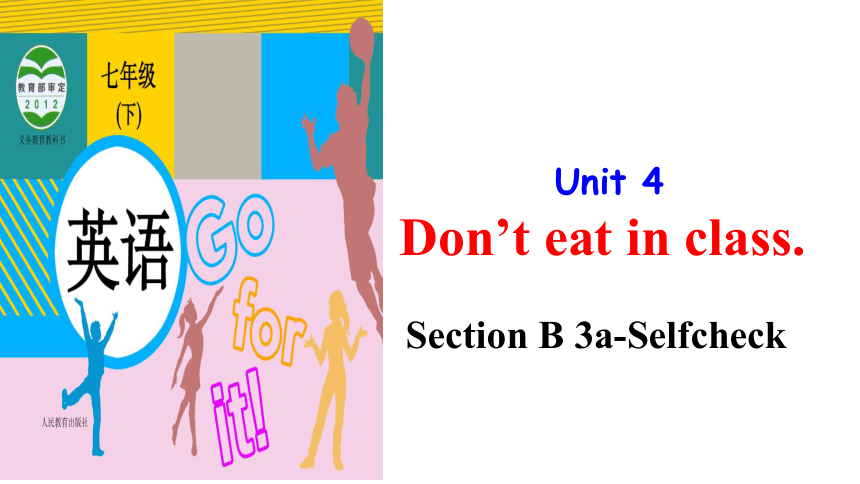 | |
| 格式 | pptx | ||
| 文件大小 | 3.4MB | ||
| 资源类型 | 试卷 | ||
| 版本资源 | 人教新目标(Go for it)版 | ||
| 科目 | 英语 | ||
| 更新时间 | 2022-03-24 10:31:05 | ||
图片预览

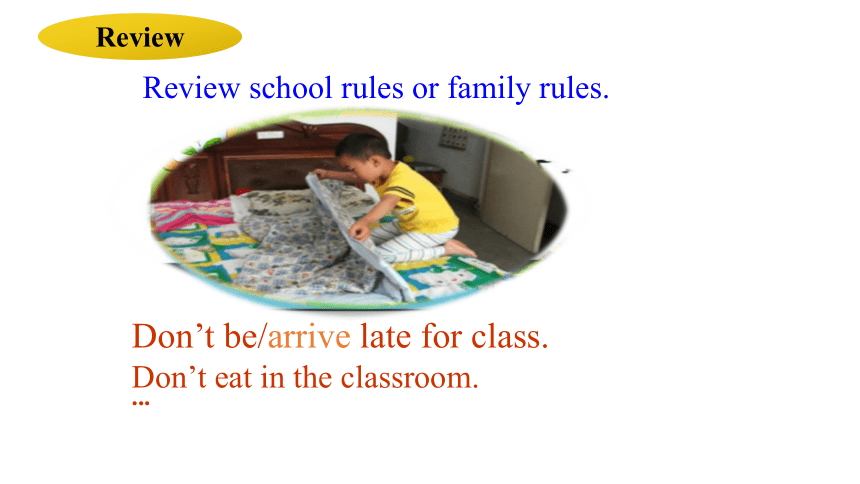
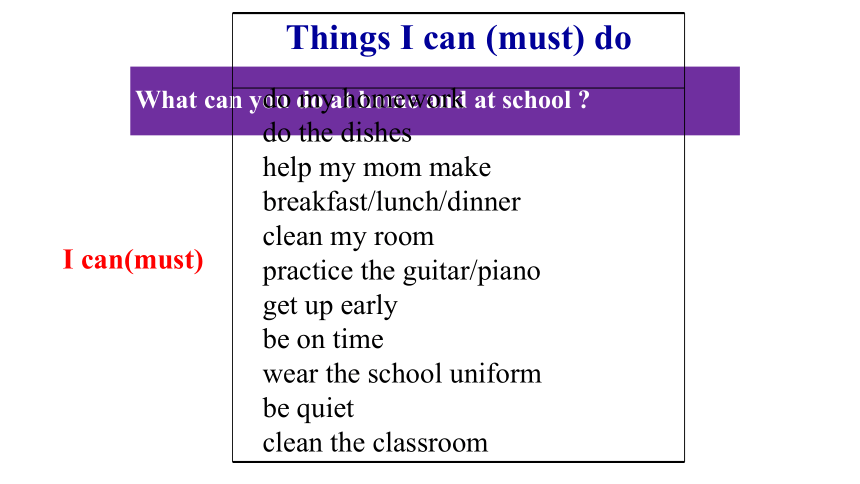
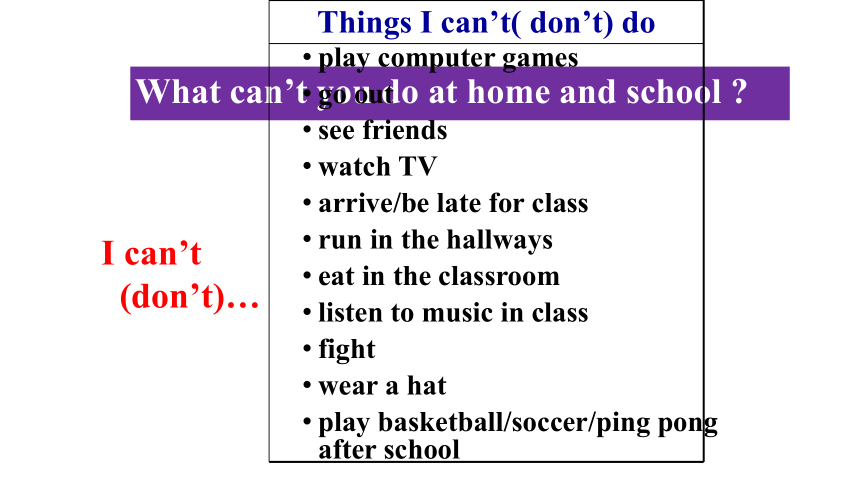
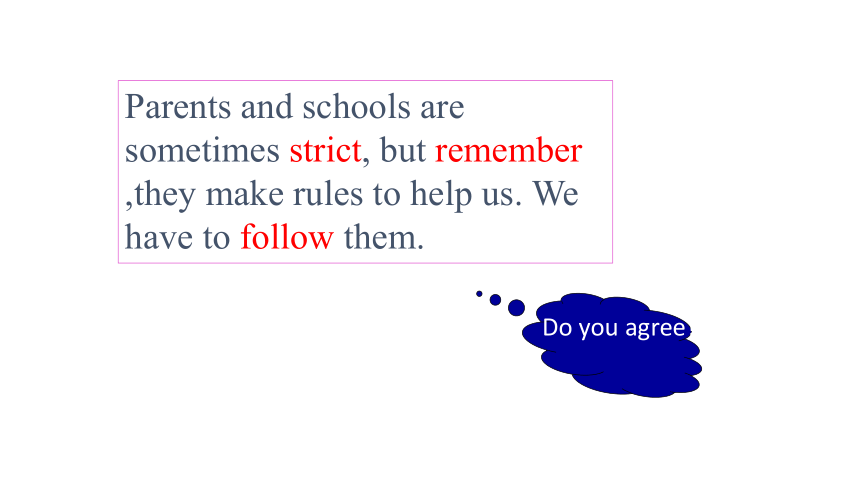
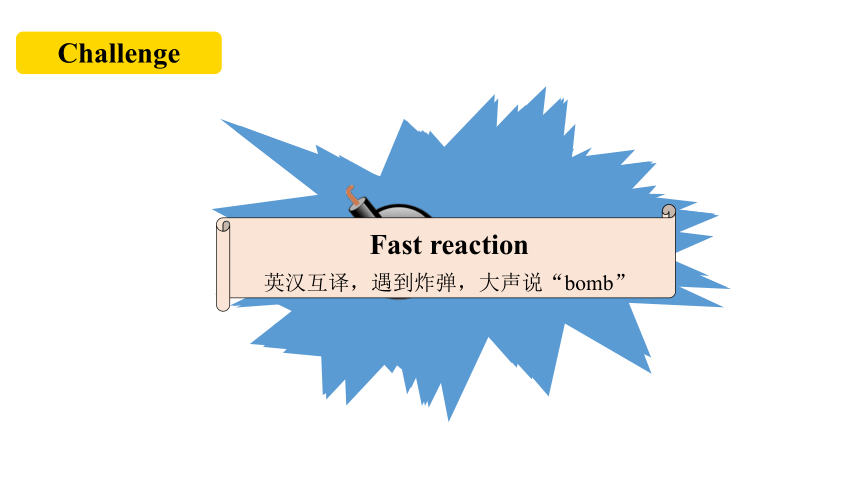
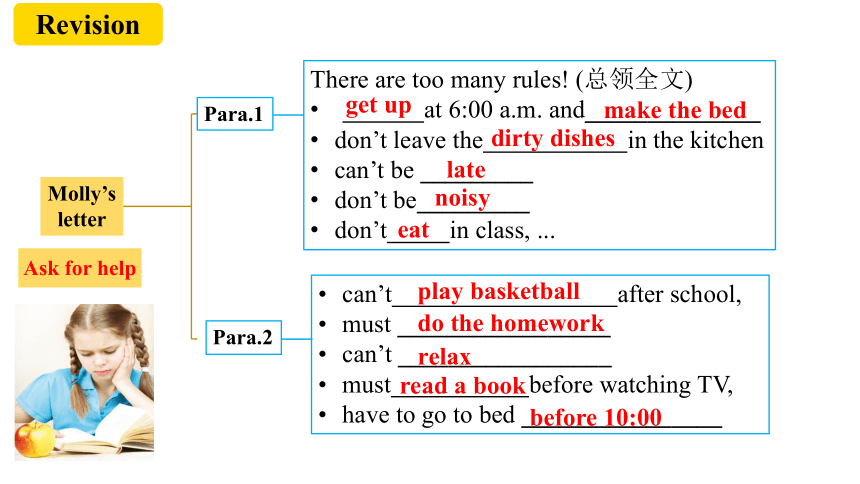
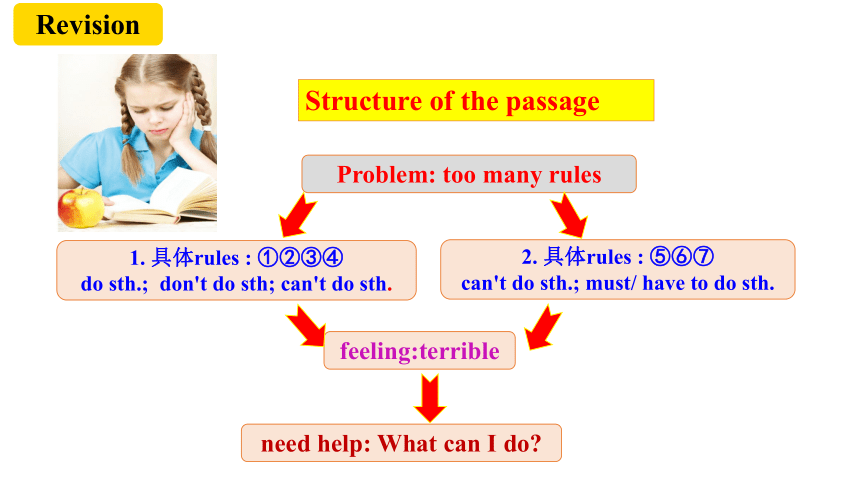
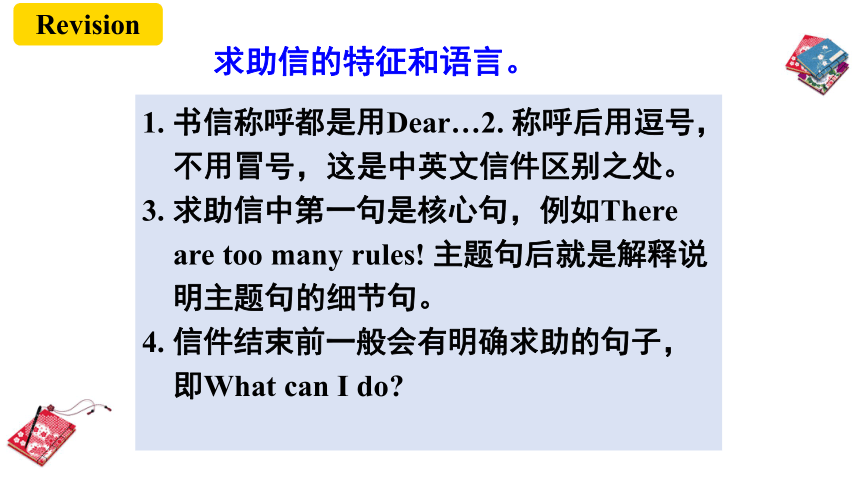
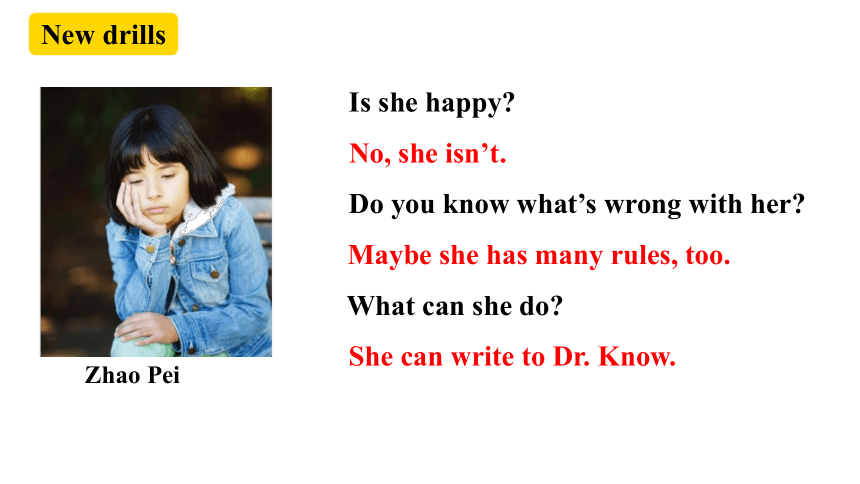
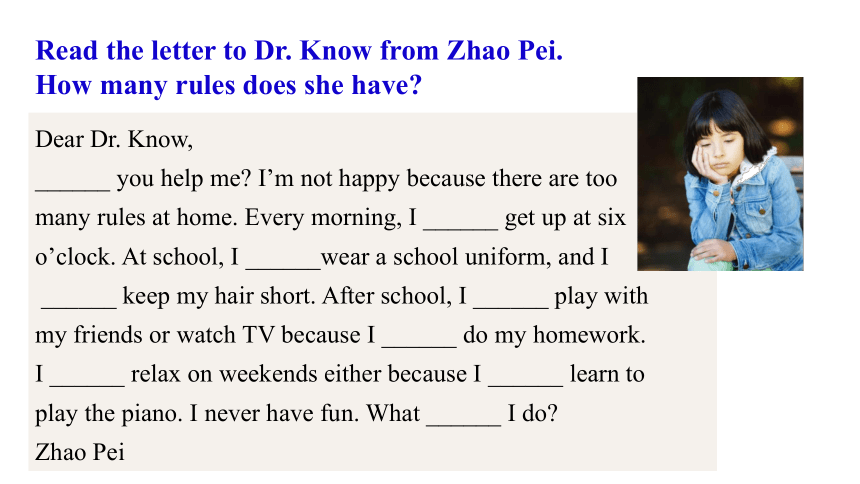
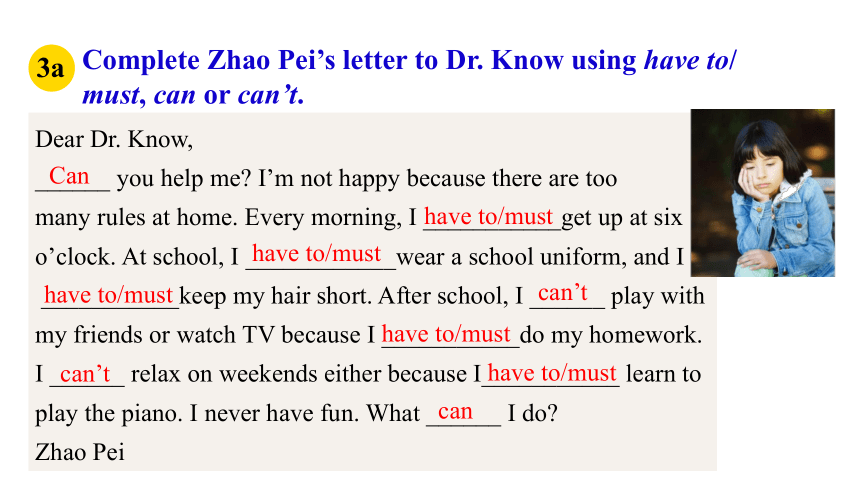
文档简介
(共44张PPT)
Unit 4
Don’t eat in class.
Section B 3a-Selfcheck
Review school rules or family rules.
Don’t be/arrive late for class.
Don’t eat in the classroom.
...
Review
What can you do at home and at school
do my homework
do the dishes
help my mom make breakfast/lunch/dinner
clean my room
practice the guitar/piano
get up early
be on time
wear the school uniform
be quiet
clean the classroom
Things I can (must) do
I can(must)
What can’t you do at home and school
play computer games
go out
see friends
watch TV
arrive/be late for class
run in the hallways
eat in the classroom
listen to music in class
fight
wear a hat
play basketball/soccer/ping pong after school
Things I can’t( don’t) do
I can’t (don’t)…
Parents and schools are sometimes strict, but remember ,they make rules to help us. We have to follow them.
Do you agree
太可怕了。
父母有时是很严格的。
睡觉前我
必须要先读书。
We have more rules.
祝你好运。
I know how you feel.
We have to follow them.
Don’t be noisy.
Fast reaction
英汉互译,遇到炸弹,大声说“bomb”
Challenge
Molly’s letter
Ask for help
There are too many rules! (总领全文)
at 6:00 a.m. and______________
don’t leave the in the kitchen
can’t be _________
don’t be_________
don’t in class, ...
Para.1
Para.2
can’t after school,
must _________________
can’t _________________
must before watching TV,
have to go to bed ________________
make the bed
get up
dirty dishes
late
noisy
eat
play basketball
do the homework
relax
read a book
before 10:00
Revision
Problem: too many rules
1. 具体rules : ①②③④
do sth.; don't do sth; can't do sth.
feeling:terrible
Structure of the passage
2. 具体rules : ⑤⑥⑦
can't do sth.; must/ have to do sth.
need help: What can I do
Revision
1. 书信称呼都是用Dear…2. 称呼后用逗号,不用冒号,这是中英文信件区别之处。
3. 求助信中第一句是核心句,例如There are too many rules! 主题句后就是解释说明主题句的细节句。
4. 信件结束前一般会有明确求助的句子,即What can I do
求助信的特征和语言。
Revision
Zhao Pei
Is she happy
No, she isn’t.
Do you know what’s wrong with her
Maybe she has many rules, too.
What can she do
She can write to Dr. Know.
New drills
Read the letter to Dr. Know from Zhao Pei.
How many rules does she have
Dear Dr. Know,
______ you help me I’m not happy because there are too
many rules at home. Every morning, I ______ get up at six
o’clock. At school, I ______wear a school uniform, and I
______ keep my hair short. After school, I ______ play with
my friends or watch TV because I ______ do my homework.
I ______ relax on weekends either because I ______ learn to
play the piano. I never have fun. What ______ I do
Zhao Pei
Complete Zhao Pei’s letter to Dr. Know using have to/
must, can or can’t.
3a
Dear Dr. Know,
______ you help me I’m not happy because there are too
many rules at home. Every morning, I ___________get up at six
o’clock. At school, I ____________wear a school uniform, and I
___________keep my hair short. After school, I ______ play with
my friends or watch TV because I ___________do my homework.
I ______ relax on weekends either because I___________ learn to
play the piano. I never have fun. What ______ I do
Zhao Pei
Can
have to/must
have to/must
have to/must
can’t
have to/must
can’t
have to/must
can
1. At school, I have to/must wear a school uniform, and I have to/must keep my hair short. 在学校,我不得不/必须穿校服,并且我不得不/必须留短发。(教材P24 3a)
【用法详解】keep在此作及物动词, “keep + sb./sth. + adj.”表示“使某人/某物保持某种状态”。
Language points
My father always keeps me very happy. 我爸爸总是让我很开心。
keep v. 保持;保留
Point1
【拓展延伸】keep作动词的其他常见用法:
keep
keep doing sth. 继续/重复做某事
keep sth.保留某物
I keep all her letters. 我保留着她所有的信。
My grandpa always keeps saying
the same thing. 我爷爷总是重复说同一件事。
1. At school, I have to/must wear a school uniform, and I have to/must keep my hair short. 在学校,我不得不/必须穿校服,并且我不得不/必须留短发。(教材P24 3a)
【用法详解】hair在此作不可数名词。
Language points
She is a nice girl with long black hair. 她是一个有着乌黑长发的漂亮姑娘。
hair n. 头发;毛发
Point2
【拓展延伸】hair还可作可数名词,强调“(一根一根的)
头发,毛发”。
I can see two grey hairs on your head. 我能看到你头上有两根白发。
2. ...because I have to/must learn to play the piano. ……因为我不得不/必须学弹钢琴。(教材P24 3a)
【用法详解】learn在句中作动词,learn to do sth.“学做某事”。
He is learning to drive a car. 他在学开车。
Language points
【拓展延伸】learn的其他常见短语:
learn v. 学习;学会
Point
learn from 向......学习 learn about学习; 了解
We should learn from Jim. 我们应该向吉姆学习。
I want to learn about Chinese culture. 我想了解中国文化。
3. I never have fun. 我从来没有开心过。(教材P24 3a)
【用法详解】have fun相当于have a good time或enjoy oneself。 have fun doing sth. 意为“做某事很高兴”。
Language points
have fun 玩得开心;过得愉快
Point
The students are having fun speaking English now. 学生们现在正开心地说英语。
1. Is Zhao Pei happy Why or why not
2. When does she have to get up every morning
3. Can she play with her friends after school Why
No, she isn’t.
Because she has many rules in her family.
She has to get up at six o’clock.
No, she can’t.
Because she has to do her homework.
抢答夺星
Post reading
4. Can she watch TV on school nights
5. What does she have to do on weekends
6. Does she have any fun
No, she can’t.
She has to learn to play the piano.
No, she doesn’t.
If you are Zhao Pei, will you be happy Why or why not
1.独立完成!
2. 组内交流!
3.展示 争优!
3分钟
Post reading
1. She has to/must get up at six o’clock.
2. She has to/must wear a school uniform.
3. She has to/must keep her hair short.
4. She can’t play with her friends or watch TV because she
has to/must do her homework.
5. She can’t relax on weekends because she has to/must
learn to play the piano.
Which Zhao Pei’s rules that you think are unfair.
Do you have the same rules
不公平的
Complete the chart with the rules in your home and
school. Put an× for the rules that you think are unfair.
Things I have to do Things I can’t do
I can’t go out on school nights.
I must do the homework first after school.
I can’t watch TV before I practice the piano.
I have to wear the uniform at school.
I have to keep my hair short.
I can’t see friends on school days.
I must get up before 6:30 and practice English.
I can’t be noisy or eat in class.
3b
too many “太多”,后跟可数名词复数形式 There are too many people
in the park now. 公园里的人太多了。
too much “太多”,后跟不可数名词 He has too much money.
他的钱太多了。
修饰动词,作状语 You always talk too much.
你总是话很多。
much too “太......”, 后跟形容词或副词 I'm much too happy today.
我今天太开心了。
1. There are _________ students in that school.
2. Our teacher is _________ strict with us.
3. The boy drinks ___________ water on the hot summer days.
too many
much too
too much
Fill in the blanks with too many, too much or much too.
leave作动词,意为“搁,放,留下”。
leave sth.+地点状语,意为“把某物遗忘在某地”。例如:
I often leave my schoolbag at home.
我经常把书包忘在家里。
read “看,读”,通常表示看书、报纸、杂志等。 He usually reads book after dinner.
他通常晚饭后看书。
look “看”,强调看的动作,后常跟介词at Look! Tom is over ther.
看!汤姆在那边。
see “看见”, 强调看的结果 I can see many birds in the tree.
我看见树上有很多鸟。
watch “观看;注视”, 指看电视、电影、比赛等。 I often watch TV on Sundays.
我经常在星期天看电视。
tell作动词,意为“告诉;讲述;说”。
tell sb. to do sth. 意为“告诉某人做某事”
tell sb. not to do sth. 意为“告诉某人不要做某事”例如:
My father often tells me ________ others at school. (help)
My father often tells me ____________ this bad man. ( not help)
to help
not to help
Please remember ___________ your ID card to school tomorrow. (bring)
I remember ____________ her the notebook yesterday. ( give)
to bring
giving
3c
Write a letter to Dr. Know. Tell him about all the rules
and how you feel about them.
________________________________________________________________________________________________________________________________________________________________________________________________________________________________________________________________________________________________________________________________________________________
______________________________________________________________________________________
______________________________________________________________________________________
1. 先对3b中自己所写的在校及在家的规矩进行整理,将在家里的规则及学校的规则分别放在一起。
2. 先将在家里的规则写成一段连贯的文字,再将在学校里的规则写成一段连贯文字,表明自己对这些规则的感受。
3. 注意开头可写“Can you help me ”来表明自己求助的目的。并注意写清自己求助的原因。
按书信的写作格式,写好开头及结尾。并再将整个信件再通读一遍。
写作指导
思路点拨
体裁 书信(注意信的格式) 话题 介绍家规、校规
时态 以一般现在时为主 人称 以第一人称为主
介绍规则,写作时要包含所有提示内容,看法要正确。
时态为一般现在时,注意must,have to,can, can't等词的恰当运用。
(1) Salutation (2) Paragraph (a) Main idea (b) Supporting details (c) Final sentence (3) Closing (1) Dear _________,
(2a) Can you help me I’m not happy
because there are too many rules.
(2b) I have to/must _________.
I can’t _______________.
(2c) I never have fun. What can I do
(3) _____________________
Structure
Can you help me
I’m not happy because there are too many rules at home.
I never have fun.
What can I do
have to/must, get up at, wear a school uniform, keep my hair short, can’t play with my friends, watch TV, do my homework, relax, learn to play the piano
可以采用的句型及短语:
Dear Dr. Know,
There are too many rules at home and at school.
At home, I have to get up early. I have to help my parents do the dishes every day. And I have to clean my room on Saturdays. I can’t go out with my friends on weekends.
At school, I can’t eat in class. And I can’t be late for school. I have to wear school uniform. I don’t like these rules. How can I relax with so many rules What can I do
Bob
Sample writing
My name is Timmy the Mouse. I must get up early at 6:30 a.m. every morning. Then I have to go to the kitchen to get food for Grandpa. I never __________ at the kitchen because I have to get there before the cat gets up. My grandpa always tells me I can’t _________. I __________ him because I don’t want the cat to get me! My grandpa ___________ with me, but I think it’s best to _____________!
1
Fill in the blanks with the words in the box.
arrive late
listen to
be noisy
follow the rules
be strict
arrive late
be noisy
listen to
is strict
follow the rules
Self Check
Tell the story about Timmy.
The mouse’s name is Timmy. He must get up early every morning
at 6:30...
These expressions may help you
get up early at 6:30 a.m. , go to the kitchen to get food, never arrive late at the kitchen, my grandpa can’t be noisy, be strict with, follow the rules
Why does Timmy have to follow the rules
My name is Timmy the Mouse. I must get up early at 6:30 a.m. every morning. Then I have to go to the kitchen to get food for Grandpa. I never arrive late at the kitchen because I have to get there before the cat gets up. My grandpa always tells me I can’t be noisy. I listen to him because I don’t want the cat to get me! My grandpa is strict with me, but I think it’s best to follow the rules!
The cat will get him if he doesn’t follow the rules.
We have to follow the rules because we need rules.
2
Use can, can’t, have to/must and don’t to write about
the rules at school. Write two sentences for each rule.
1. arrive late/class
________________________________
________________________________
2. listen/teacher
________________________________
________________________________
Don’t arrive late for class.
We can’t arrive late for class.
Listen to the teacher.
We must/have to listen to the teacher.
3. be noisy/library
_______________________________________
_______________________________________
4. speak English/English class
_______________________________________
_______________________________________
5. eat/dining hall
_______________________________________
_______________________________________
Eat in the dining hall.
We must/have to eat in the dining hall.
Don’t be noisy in the library.
We can’t be noisy in the library.
Speak English in English class.
We must/have to speak English in English class.
你可以在音乐教室里听音乐。
You can _____ _____ _____ in the music room.
在上学日的晚上我不能外出。
I can’t _____ _____ on school nights.
我妈妈经常帮我整理床铺。
My mother often helps me _____ _____ _____.
一、根据汉语意思完成句子,每空一词
listen to music
1
2
3
go out
make the bed
Exercises
完成家庭作业前你不能看电视。
You can’t watch TV _______ you ________ ________ _________.
请你把餐具洗一下,好吗?
Could you please ______ ______ ______
对我们来说,对别人诚实很重要。
It is ________ for us to be honest to others.
4
5
6
before finish your homework
do the dishes
important
二、按要求完成下列句子,每空一词
You can’t go out on school nights. (改为否定祈使句)
_______ ______ out on school nights.
He can go to the movies, too. (改为否定句)
He ______ go to the movies, ______.
My brother has to make bed by himself. (改为一般疑问句)
______ your brother ______ to make bed by himself
1
2
3
Don’t go
can’t either
Does have
Homework
做校园文化建设的主人
1. 复习本单元的单词和短语及重点句型。
2. 制作班级规则,以海报的形式在班内进行展览。
thank you!
Unit 4
Don’t eat in class.
Section B 3a-Selfcheck
Review school rules or family rules.
Don’t be/arrive late for class.
Don’t eat in the classroom.
...
Review
What can you do at home and at school
do my homework
do the dishes
help my mom make breakfast/lunch/dinner
clean my room
practice the guitar/piano
get up early
be on time
wear the school uniform
be quiet
clean the classroom
Things I can (must) do
I can(must)
What can’t you do at home and school
play computer games
go out
see friends
watch TV
arrive/be late for class
run in the hallways
eat in the classroom
listen to music in class
fight
wear a hat
play basketball/soccer/ping pong after school
Things I can’t( don’t) do
I can’t (don’t)…
Parents and schools are sometimes strict, but remember ,they make rules to help us. We have to follow them.
Do you agree
太可怕了。
父母有时是很严格的。
睡觉前我
必须要先读书。
We have more rules.
祝你好运。
I know how you feel.
We have to follow them.
Don’t be noisy.
Fast reaction
英汉互译,遇到炸弹,大声说“bomb”
Challenge
Molly’s letter
Ask for help
There are too many rules! (总领全文)
at 6:00 a.m. and______________
don’t leave the in the kitchen
can’t be _________
don’t be_________
don’t in class, ...
Para.1
Para.2
can’t after school,
must _________________
can’t _________________
must before watching TV,
have to go to bed ________________
make the bed
get up
dirty dishes
late
noisy
eat
play basketball
do the homework
relax
read a book
before 10:00
Revision
Problem: too many rules
1. 具体rules : ①②③④
do sth.; don't do sth; can't do sth.
feeling:terrible
Structure of the passage
2. 具体rules : ⑤⑥⑦
can't do sth.; must/ have to do sth.
need help: What can I do
Revision
1. 书信称呼都是用Dear…2. 称呼后用逗号,不用冒号,这是中英文信件区别之处。
3. 求助信中第一句是核心句,例如There are too many rules! 主题句后就是解释说明主题句的细节句。
4. 信件结束前一般会有明确求助的句子,即What can I do
求助信的特征和语言。
Revision
Zhao Pei
Is she happy
No, she isn’t.
Do you know what’s wrong with her
Maybe she has many rules, too.
What can she do
She can write to Dr. Know.
New drills
Read the letter to Dr. Know from Zhao Pei.
How many rules does she have
Dear Dr. Know,
______ you help me I’m not happy because there are too
many rules at home. Every morning, I ______ get up at six
o’clock. At school, I ______wear a school uniform, and I
______ keep my hair short. After school, I ______ play with
my friends or watch TV because I ______ do my homework.
I ______ relax on weekends either because I ______ learn to
play the piano. I never have fun. What ______ I do
Zhao Pei
Complete Zhao Pei’s letter to Dr. Know using have to/
must, can or can’t.
3a
Dear Dr. Know,
______ you help me I’m not happy because there are too
many rules at home. Every morning, I ___________get up at six
o’clock. At school, I ____________wear a school uniform, and I
___________keep my hair short. After school, I ______ play with
my friends or watch TV because I ___________do my homework.
I ______ relax on weekends either because I___________ learn to
play the piano. I never have fun. What ______ I do
Zhao Pei
Can
have to/must
have to/must
have to/must
can’t
have to/must
can’t
have to/must
can
1. At school, I have to/must wear a school uniform, and I have to/must keep my hair short. 在学校,我不得不/必须穿校服,并且我不得不/必须留短发。(教材P24 3a)
【用法详解】keep在此作及物动词, “keep + sb./sth. + adj.”表示“使某人/某物保持某种状态”。
Language points
My father always keeps me very happy. 我爸爸总是让我很开心。
keep v. 保持;保留
Point1
【拓展延伸】keep作动词的其他常见用法:
keep
keep doing sth. 继续/重复做某事
keep sth.保留某物
I keep all her letters. 我保留着她所有的信。
My grandpa always keeps saying
the same thing. 我爷爷总是重复说同一件事。
1. At school, I have to/must wear a school uniform, and I have to/must keep my hair short. 在学校,我不得不/必须穿校服,并且我不得不/必须留短发。(教材P24 3a)
【用法详解】hair在此作不可数名词。
Language points
She is a nice girl with long black hair. 她是一个有着乌黑长发的漂亮姑娘。
hair n. 头发;毛发
Point2
【拓展延伸】hair还可作可数名词,强调“(一根一根的)
头发,毛发”。
I can see two grey hairs on your head. 我能看到你头上有两根白发。
2. ...because I have to/must learn to play the piano. ……因为我不得不/必须学弹钢琴。(教材P24 3a)
【用法详解】learn在句中作动词,learn to do sth.“学做某事”。
He is learning to drive a car. 他在学开车。
Language points
【拓展延伸】learn的其他常见短语:
learn v. 学习;学会
Point
learn from 向......学习 learn about学习; 了解
We should learn from Jim. 我们应该向吉姆学习。
I want to learn about Chinese culture. 我想了解中国文化。
3. I never have fun. 我从来没有开心过。(教材P24 3a)
【用法详解】have fun相当于have a good time或enjoy oneself。 have fun doing sth. 意为“做某事很高兴”。
Language points
have fun 玩得开心;过得愉快
Point
The students are having fun speaking English now. 学生们现在正开心地说英语。
1. Is Zhao Pei happy Why or why not
2. When does she have to get up every morning
3. Can she play with her friends after school Why
No, she isn’t.
Because she has many rules in her family.
She has to get up at six o’clock.
No, she can’t.
Because she has to do her homework.
抢答夺星
Post reading
4. Can she watch TV on school nights
5. What does she have to do on weekends
6. Does she have any fun
No, she can’t.
She has to learn to play the piano.
No, she doesn’t.
If you are Zhao Pei, will you be happy Why or why not
1.独立完成!
2. 组内交流!
3.展示 争优!
3分钟
Post reading
1. She has to/must get up at six o’clock.
2. She has to/must wear a school uniform.
3. She has to/must keep her hair short.
4. She can’t play with her friends or watch TV because she
has to/must do her homework.
5. She can’t relax on weekends because she has to/must
learn to play the piano.
Which Zhao Pei’s rules that you think are unfair.
Do you have the same rules
不公平的
Complete the chart with the rules in your home and
school. Put an× for the rules that you think are unfair.
Things I have to do Things I can’t do
I can’t go out on school nights.
I must do the homework first after school.
I can’t watch TV before I practice the piano.
I have to wear the uniform at school.
I have to keep my hair short.
I can’t see friends on school days.
I must get up before 6:30 and practice English.
I can’t be noisy or eat in class.
3b
too many “太多”,后跟可数名词复数形式 There are too many people
in the park now. 公园里的人太多了。
too much “太多”,后跟不可数名词 He has too much money.
他的钱太多了。
修饰动词,作状语 You always talk too much.
你总是话很多。
much too “太......”, 后跟形容词或副词 I'm much too happy today.
我今天太开心了。
1. There are _________ students in that school.
2. Our teacher is _________ strict with us.
3. The boy drinks ___________ water on the hot summer days.
too many
much too
too much
Fill in the blanks with too many, too much or much too.
leave作动词,意为“搁,放,留下”。
leave sth.+地点状语,意为“把某物遗忘在某地”。例如:
I often leave my schoolbag at home.
我经常把书包忘在家里。
read “看,读”,通常表示看书、报纸、杂志等。 He usually reads book after dinner.
他通常晚饭后看书。
look “看”,强调看的动作,后常跟介词at Look! Tom is over ther.
看!汤姆在那边。
see “看见”, 强调看的结果 I can see many birds in the tree.
我看见树上有很多鸟。
watch “观看;注视”, 指看电视、电影、比赛等。 I often watch TV on Sundays.
我经常在星期天看电视。
tell作动词,意为“告诉;讲述;说”。
tell sb. to do sth. 意为“告诉某人做某事”
tell sb. not to do sth. 意为“告诉某人不要做某事”例如:
My father often tells me ________ others at school. (help)
My father often tells me ____________ this bad man. ( not help)
to help
not to help
Please remember ___________ your ID card to school tomorrow. (bring)
I remember ____________ her the notebook yesterday. ( give)
to bring
giving
3c
Write a letter to Dr. Know. Tell him about all the rules
and how you feel about them.
________________________________________________________________________________________________________________________________________________________________________________________________________________________________________________________________________________________________________________________________________________________
______________________________________________________________________________________
______________________________________________________________________________________
1. 先对3b中自己所写的在校及在家的规矩进行整理,将在家里的规则及学校的规则分别放在一起。
2. 先将在家里的规则写成一段连贯的文字,再将在学校里的规则写成一段连贯文字,表明自己对这些规则的感受。
3. 注意开头可写“Can you help me ”来表明自己求助的目的。并注意写清自己求助的原因。
按书信的写作格式,写好开头及结尾。并再将整个信件再通读一遍。
写作指导
思路点拨
体裁 书信(注意信的格式) 话题 介绍家规、校规
时态 以一般现在时为主 人称 以第一人称为主
介绍规则,写作时要包含所有提示内容,看法要正确。
时态为一般现在时,注意must,have to,can, can't等词的恰当运用。
(1) Salutation (2) Paragraph (a) Main idea (b) Supporting details (c) Final sentence (3) Closing (1) Dear _________,
(2a) Can you help me I’m not happy
because there are too many rules.
(2b) I have to/must _________.
I can’t _______________.
(2c) I never have fun. What can I do
(3) _____________________
Structure
Can you help me
I’m not happy because there are too many rules at home.
I never have fun.
What can I do
have to/must, get up at, wear a school uniform, keep my hair short, can’t play with my friends, watch TV, do my homework, relax, learn to play the piano
可以采用的句型及短语:
Dear Dr. Know,
There are too many rules at home and at school.
At home, I have to get up early. I have to help my parents do the dishes every day. And I have to clean my room on Saturdays. I can’t go out with my friends on weekends.
At school, I can’t eat in class. And I can’t be late for school. I have to wear school uniform. I don’t like these rules. How can I relax with so many rules What can I do
Bob
Sample writing
My name is Timmy the Mouse. I must get up early at 6:30 a.m. every morning. Then I have to go to the kitchen to get food for Grandpa. I never __________ at the kitchen because I have to get there before the cat gets up. My grandpa always tells me I can’t _________. I __________ him because I don’t want the cat to get me! My grandpa ___________ with me, but I think it’s best to _____________!
1
Fill in the blanks with the words in the box.
arrive late
listen to
be noisy
follow the rules
be strict
arrive late
be noisy
listen to
is strict
follow the rules
Self Check
Tell the story about Timmy.
The mouse’s name is Timmy. He must get up early every morning
at 6:30...
These expressions may help you
get up early at 6:30 a.m. , go to the kitchen to get food, never arrive late at the kitchen, my grandpa can’t be noisy, be strict with, follow the rules
Why does Timmy have to follow the rules
My name is Timmy the Mouse. I must get up early at 6:30 a.m. every morning. Then I have to go to the kitchen to get food for Grandpa. I never arrive late at the kitchen because I have to get there before the cat gets up. My grandpa always tells me I can’t be noisy. I listen to him because I don’t want the cat to get me! My grandpa is strict with me, but I think it’s best to follow the rules!
The cat will get him if he doesn’t follow the rules.
We have to follow the rules because we need rules.
2
Use can, can’t, have to/must and don’t to write about
the rules at school. Write two sentences for each rule.
1. arrive late/class
________________________________
________________________________
2. listen/teacher
________________________________
________________________________
Don’t arrive late for class.
We can’t arrive late for class.
Listen to the teacher.
We must/have to listen to the teacher.
3. be noisy/library
_______________________________________
_______________________________________
4. speak English/English class
_______________________________________
_______________________________________
5. eat/dining hall
_______________________________________
_______________________________________
Eat in the dining hall.
We must/have to eat in the dining hall.
Don’t be noisy in the library.
We can’t be noisy in the library.
Speak English in English class.
We must/have to speak English in English class.
你可以在音乐教室里听音乐。
You can _____ _____ _____ in the music room.
在上学日的晚上我不能外出。
I can’t _____ _____ on school nights.
我妈妈经常帮我整理床铺。
My mother often helps me _____ _____ _____.
一、根据汉语意思完成句子,每空一词
listen to music
1
2
3
go out
make the bed
Exercises
完成家庭作业前你不能看电视。
You can’t watch TV _______ you ________ ________ _________.
请你把餐具洗一下,好吗?
Could you please ______ ______ ______
对我们来说,对别人诚实很重要。
It is ________ for us to be honest to others.
4
5
6
before finish your homework
do the dishes
important
二、按要求完成下列句子,每空一词
You can’t go out on school nights. (改为否定祈使句)
_______ ______ out on school nights.
He can go to the movies, too. (改为否定句)
He ______ go to the movies, ______.
My brother has to make bed by himself. (改为一般疑问句)
______ your brother ______ to make bed by himself
1
2
3
Don’t go
can’t either
Does have
Homework
做校园文化建设的主人
1. 复习本单元的单词和短语及重点句型。
2. 制作班级规则,以海报的形式在班内进行展览。
thank you!
同课章节目录
- Unit 1 Can you play the guitar?
- Section A
- Section B
- Unit 2 What time do you go to school?
- Section A
- Section B
- Unit 3 How do you get to school?
- Section A
- Section B
- Unit 4 Don't eat in class.
- Section A
- Section B
- Unit 5 Why do you like pandas?
- Section A
- Section B
- Unit 6 I'm watching TV.
- Section A
- Section B
- Review of Units 1-6
- Unit 7 It's raining!
- Section A
- Section B
- Unit 8 Is there a post office near here?
- Section A
- Section B
- Unit 9 What does he look like?
- Section A
- Section B
- Unit 10 I'd like some noodles.
- Section A
- Section B
- Unit 11 How was your school trip?
- Section A
- Section B
- Unit 12 What did you do last weekend?
- Section A
- Section B
